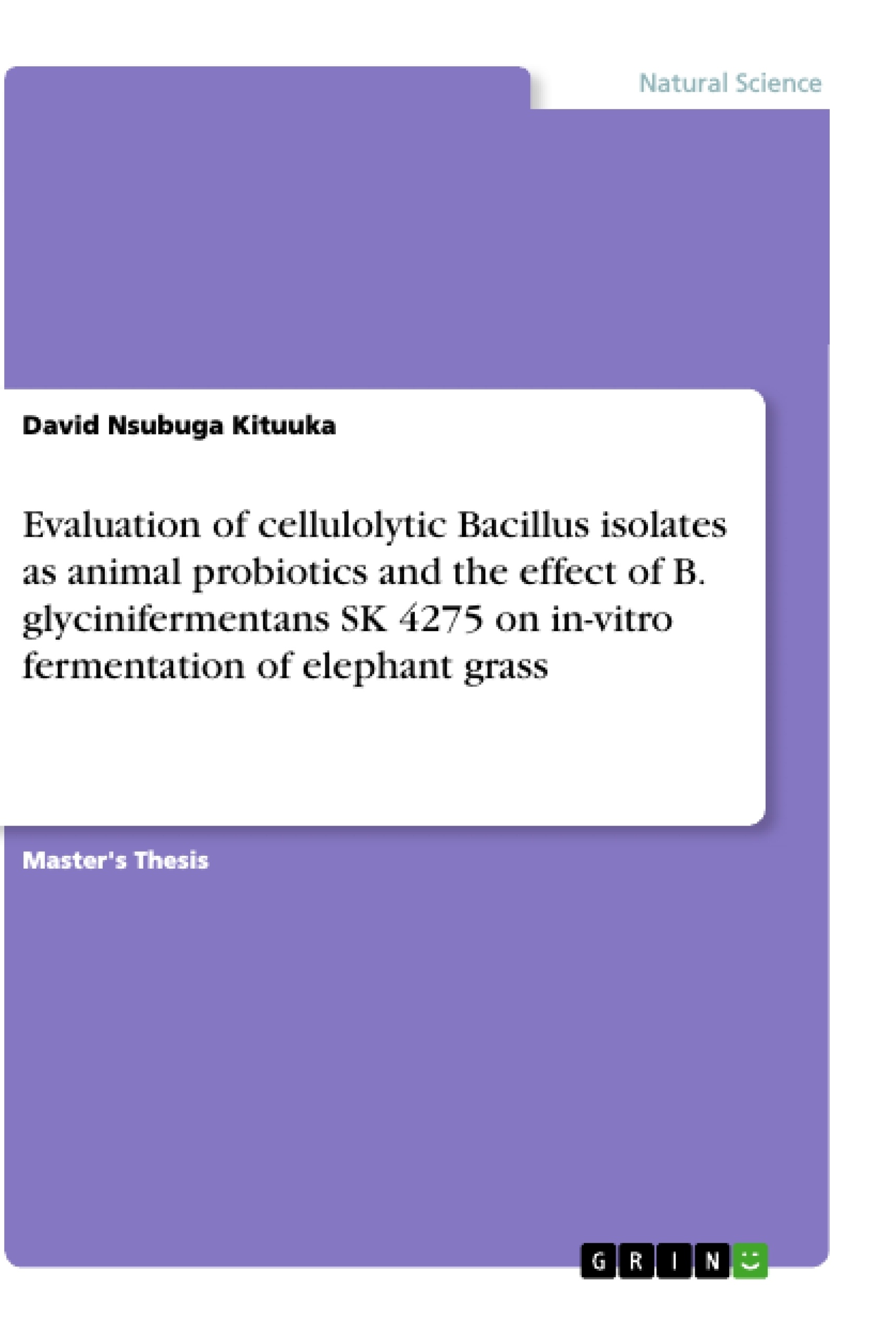Not all Bacillus strains are equally resistant to the harsh evironment in the gastrointestial tract besides there are also variations in enzyme activity, and antimicrobial activity, hence selection of appropriate Bacillus strains is essential for the effectiveness of probiotic additives for use in animal feed. The purpose of this study was to describe in vitro probiotic properties such as acid tolerance, bile tolerance, antimicrobial activity and safety, of two Bacillus strains, B. glycinifermentans SK4275 and B. paralicheniformis SK4278 isolated from elephant grass in addition to their cellulolytic enzyme activity. The effect of live B. glycinifermentans SK 4275 on in vitro fermentation of elephant grass (P ennisetum purpureum) was also investigated.
Inhaltsverzeichnis (Table of Contents)
- Chapter 1. Introduction
- 1.1. Elephant grass as a feed resource for ruminants
- 1.2. Concerns of antibiotics as feed additives
- 1.3. The role of Bacillus strains as animal probiotics
- 1.4. Bacillus glycinifermentans and B. paralichineformis
- 1.5. Purpose of this study
- Chapter 2. Material and Methods
- 2.1. Collection and preparation of elephant grass
- 2.2. Isolation of Bacillus strains from elephant grass
- 2.3. Screening for enzyme activity
- 2.4. Screening for probiotic properties of B. glycinifermentans SK4275 and B. Paralicheniformis SK4278 in vitro
- 2.4.1. Acid tolerance
- 2.4.2. Bile tolerance
- 2.4.3. Sodium chloride tolerance
- 2.4.4. Antimicrobial activity
- 2.4.5. Antibiotic sensitivity
- 2.4.6. Hemolytic activity
- 2.5. In vitro ruminal fermentation
- 2.5.1. Substrate, Bacillus and treatments
- 2.5.2. In vitro study
- 2.5.3. Sampling and analysis
- 2.6. Statistical analysis
- Chapter 3 Results and discussion
- 3.1. Identification of isolated Bacillus strains
- 3.2. Enzyme activity
- 3.3. In vitro assessment of characteristics for survival in gastrointestinal tract
- 3.3.1. Acid tolerance
- 3.3.2. Bile tolerance
- 3.3.3. Antimicrobial activity
- 3.3.4. Sodium chloride tolerance
- 3.4. Biosafety assessment
- 3.4.1. Antibiotic sensitivity
- 3.4.2. Hemolytic activity
- 3.5. In vitro fermentation characteristics
- 3.5.1. pH, total gas and ammonia-N concentration
- 3.5.2. Volatile fatty acids
- 3.5.3. Total viable count in incubation fluid
- 3.5.4. In vitro NDF digestibility and ADF digestibility
- 3.6. Discussion of in vitro fermentation findings
- Chapter 4. Conclusion.
Zielsetzung und Themenschwerpunkte (Objectives and Key Themes)
This Master's thesis investigates the potential of cellulolytic Bacillus isolates as animal probiotics, focusing on the efficacy of B. glycinifermentans SK4275 on in vitro fermentation of elephant grass. The study aims to evaluate the probiotic properties of selected Bacillus strains, assess their safety, and investigate their impact on the ruminal fermentation process. Key themes of the thesis include:- The use of elephant grass as a feed resource for ruminants
- The potential of Bacillus strains as animal probiotics
- The effects of B. glycinifermentans SK4275 on in vitro ruminal fermentation of elephant grass
- The evaluation of probiotic properties like acid, bile and sodium chloride tolerance, antimicrobial activity, and antibiotic sensitivity.
- The biosafety assessment of Bacillus strains including hemolytic activity.
Zusammenfassung der Kapitel (Chapter Summaries)
- Chapter 1 introduces the importance of elephant grass as a feed resource for ruminants and the concerns regarding the use of antibiotics as feed additives. It highlights the potential of Bacillus strains as animal probiotics and specifically focuses on the characteristics of B. glycinifermentans and B. paralichineformis. The chapter concludes with outlining the study's objectives.
- Chapter 2 outlines the materials and methods used in the study. This includes details on the collection and preparation of elephant grass, the isolation of Bacillus strains, the screening for enzyme activity, and the evaluation of probiotic properties of B. glycinifermentans SK4275 and B. paralicheniformis SK4278 in vitro. The chapter also describes the in vitro ruminal fermentation procedures and the statistical analysis employed.
- Chapter 3 presents the results and discussion of the study's findings. The chapter focuses on the identification of the isolated Bacillus strains, their enzyme activity, and in vitro assessment of their ability to survive in the gastrointestinal tract. It examines their biosafety aspects like antibiotic sensitivity and hemolytic activity. The chapter concludes with a detailed analysis of the in vitro fermentation characteristics, including pH, total gas, ammonia-N concentration, volatile fatty acids, total viable count, and in vitro NDF and ADF digestibility.
Schlüsselwörter (Keywords)
The key terms associated with this study include: Bacillus, probiotics, animal nutrition, elephant grass, ruminants, in vitro fermentation, ruminal digestion, cellulolytic activity, enzyme activity, acid tolerance, bile tolerance, antimicrobial activity, antibiotic sensitivity, hemolytic activity, NDF digestibility, ADF digestibility, and biosafety.Frequently Asked Questions
What is the main focus of this study on Bacillus isolates?
The study evaluates specific Bacillus strains isolated from elephant grass as potential animal probiotics, focusing on their enzyme activity and effects on ruminal fermentation.
Which specific Bacillus strains were investigated?
The research focuses on Bacillus glycinifermentans SK4275 and Bacillus paralicheniformis SK4278.
What probiotic properties were tested in vitro?
The strains were tested for acid tolerance, bile tolerance, sodium chloride tolerance, antimicrobial activity, and antibiotic sensitivity to ensure survival in the gastrointestinal tract.
Why is elephant grass used in this research?
Elephant grass (Pennisetum purpureum) is a significant feed resource for ruminants. The study looks at how probiotics can improve its fermentation and digestibility (NDF/ADF).
What were the findings regarding biosafety?
The study included a biosafety assessment covering antibiotic sensitivity and hemolytic activity to ensure the strains are safe for use as animal feed additives.
How does B. glycinifermentans SK4275 affect ruminal fermentation?
The research analyzed its impact on pH levels, total gas production, ammonia-N concentration, and volatile fatty acids during the fermentation process.
- Quote paper
- David Nsubuga Kituuka (Author), 2018, Evaluation of cellulolytic Bacillus isolates as animal probiotics and the effect of B. glycinifermentans SK 4275 on in-vitro fermentation of elephant grass, Munich, GRIN Verlag, https://www.grin.com/document/509893



